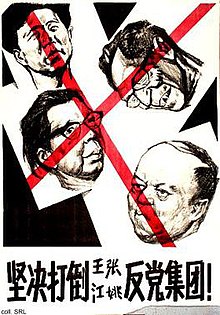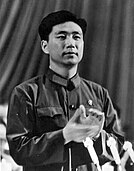
Gang of Four
| History of the People's Republic of China |
|---|
 |
|
|
The Gang of Four (simplified Chinese: 四人帮; traditional Chinese: 四人幫; pinyin: Sì rén bāng) was a Maoist political faction composed of four Chinese Communist Party (CCP) officials. They came to prominence during the Cultural Revolution (1966–1976) and were later charged with a series of treasonous crimes due to their responsibility for the excesses and failures in the Cultural Revolution. The gang's leading figure was Jiang Qing (Mao Zedong's last wife). The other members were Zhang Chunqiao, Yao Wenyuan, and Wang Hongwen.[1]

The Gang of Four controlled the power organs of the CCP through the later stages of the Cultural Revolution, although it remains unclear which major decisions were made by Mao Zedong and carried out by the Gang, and which were the result of the Gang of Four's own planning.

Their fall did not amount to a rejection of the Cultural Revolution as such; it was organized by the new leader, Premier Hua Guofeng, and others who had risen during that period. Significant repudiation of the entire process of change came later, with the return of Deng Xiaoping at the 11th National Congress of the Chinese Communist Party[2] and Hua's gradual loss of authority.[3]

Formation
The group was led by Jiang Qing, and consisted of three of her close associates, Zhang Chunqiao, Yao Wenyuan, and Wang Hongwen. Two other men who were already dead in 1976, Kang Sheng and Xie Fuzhi, were named as having been part of the "Gang". Chen Boda and Mao Yuanxin, the latter being Mao's nephew, were also considered some of the Gang's closer associates.

Most Western accounts consider that the actual leadership of the Cultural Revolution consisted of a wider group, referring predominantly to the members of the Central Cultural Revolution Group. Most prominent was Lin Biao, until his purported defection from China and death in a plane crash in 1971. Chen Boda is often classed as a member of Lin's faction rather than Jiang Qing's.[4]

Role
This section needs additional citations for verification. (October 2018) |

At the beginning of the Cultural Revolution, on November 10, 1965, Yao Wenyuan, in one of his most famous pieces of writing, published an article in Wenhuibao criticizing the play Hai Rui Dismissed from Office.[1] The article argued that the opera was actually a sympathetic portrayal of the reformist efforts of the military hero Peng Dehuai and thus an attack on Chairman Mao's Great Leap Forward. Mao subsequently purged Peng from power.[5][6] The article is cited as the spark that launched the Cultural Revolution.[7]

Jiang Qing staged revolutionary operas during the Cultural Revolution and met with the Red Guards.[8][9]

The removal of this group from power is sometimes considered to have marked the end of the Cultural Revolution, which had been launched by Mao in 1966 as part of his power struggle with leaders such as Liu Shaoqi, Deng Xiaoping and Peng Zhen. Mao placed his wife Jiang Qing, a former film actress who before 1966 had not taken a public political role, in charge of the country's cultural apparatus. Zhang, Yao and Wang were party leaders in Shanghai who had played leading roles in securing that city for Mao during the Cultural Revolution.

Around the time of the death of Lin Biao in 1971, the Cultural Revolution began to lose momentum. The new commanders of the People's Liberation Army demanded that order be restored in light of the dangerous situation along the border with the Soviet Union (see Sino-Soviet split). Premier Zhou Enlai, who had accepted the Cultural Revolution, but never fully supported it, regained his authority, and used it to bring Deng Xiaoping back into the Party leadership at the 10th Party Congress in 1973. Liu Shaoqi had meanwhile died in prison in 1969.

Near the end of Mao's life, a power struggle occurred between the Gang of Four and the alliance of Deng Xiaoping, Zhou Enlai, and Ye Jianying.[10]

Downfall

Zhou Enlai died in January 1976, and, in the subsequent months, a power struggle occurred in the top echelons of the party. The reformist Deng was named acting premier, while the Gang of Four began using their newspapers to criticize Deng and to mobilize their urban militia groups. Much of the military and party security remained under the control of the party elders of the Central Committee, who generally took a cautious role in mediating between the reformist Deng and the radical Gang of Four. They agreed to the removal of Deng from office after the April Tiananmen Incident but took steps to ensure that Deng and his allies would not be personally harmed in the process.

On September 9, Chairman Mao died. For the next few weeks the Gang of Four retained control over the government media, and many articles appeared on the theme of "principles laid down" (or "established") by Mao near the end of his life.[11][12] (The words "principles laid down" were themselves supposedly a quotation from Mao, but their canonical status was in dispute.[11]) Urban militia units commanded by supporters of the radical group were placed on a heightened state of readiness.[13][12]

Premier Hua Guofeng attacked the radicals' media line at a Politburo meeting in late September;[14] but Jiang Qing emphatically disagreed with Hua, and she insisted that she be named as the new party chairman.[14] The meeting ended inconclusively.[14] On October 4 the radical group warned, via an article in the Guangming Daily, that any revisionist who interfered with the established principles would "come to no good end".[12]

The radicals hoped that the key military leaders Wang Dongxing and Chen Xilian would support them, but instead, Hua won the Army over to his side. On 6 October 1976, Hua had the four leading radicals and a number of their lesser associates arrested. Han Suyin gave a detailed account of their overthrow:

An emergency session of the Politburo was to take place in the Great Hall of the People that evening. Their presence was required. Since Wang Dongxing had been their ally, they did not suspect him... As they passed through the swinging doors into the entrance lobby, they were apprehended and led off in handcuffs. A special 8341 unit then went to Madam Mao's residence at No. 17 Fisherman's Terrace and arrested her. That night Mao Yuanxin was arrested in Manchuria, and the propagandists of the Gang of Four in Peking University and in newspaper offices were taken into custody. All was done with quiet and efficiency. In Shanghai, the Gang's supporters received a message to come to Beijing "for a meeting". They came and were arrested. Thus, without shedding a drop of blood, the plans of the Gang of Four to wield supreme power were ended.[15]
According to historian Immanuel C.Y. Hsü, the operation was not completely bloodless – Wang Hongwen killed two of the guards trying to capture him and was wounded himself before being subdued.[16]

Beginning on 21 October, nationwide denunciations of the Gang began, which culminated in the December release of files related to the Gang's alleged crimes to the public. The party issued a denunciation of the Gang of Four as "left in form, right in essence".[17][18] Government media blamed the Gang of Four and Lin Biao for the excesses of the Cultural Revolution. Celebrations were prominent and not limited to the streets of Beijing and other major cities. During the nationwide "Movement of Exposition, Criticism and Uncovering (揭批查运动)" millions of formerly "rebel faction" red guards were publicly criticized as they were thought to be related to the Gang of Four.

Aftermath
Immediately after the arrests, Premier Hua Guofeng, Marshal Ye Jianying, and economic czars Chen Yun and Li Xiannian formed the core of the next party leadership.[19] These four, together with the rehabilitated Deng Xiaoping and Wang Dongxing, were elected party Vice Chairmen at the August 1977 National Congress of the Chinese Communist Party.[20] At the politburo level, the membership of all four living marshals, seven other generals and at least five others with close military ties reflected the deep concern for national stability.

Trial
The Gang of Four trials were part of the communist party's effort to establish an institutionalized justice system.[21]: 222 The trials were highly visible to the Chinese public thanks to the daily television broadcasts of trial sessions and wide circulation of documentary films about the trials.[21]: 222

In late 1980, the four deposed leaders were subjected to a trial by the Supreme People's Court of China with Jiang Hua presiding; in January 1981, they were convicted of anti-party activities. During the trial, Jiang Qing in particular was extremely defiant, protesting loudly and bursting into tears at some points. She was the only member of the Gang of Four to argue on her own behalf. The defence's argument was that she obeyed the orders of Chairman Mao Zedong at all times. Zhang Chunqiao refused to admit any wrongdoing. Yao Wenyuan and Wang Hongwen expressed repentance and confessed their alleged crimes.[22]

The prosecution separated political errors from actual crimes. Among the latter were the usurpation of state power and party leadership; the persecution of some 750,000 people, 34,375 of whom died during the period 1966–1976.[23] The official records of the trial have not yet been released.[as of?][citation needed]

Audience members who attended the opening of the trial included selected people's representatives from each province and autonomous region, as well as victims' families including the widows of Liu Shaoqi, He Long, and Luo Ruiqing.[21]: 223

Jiang Qing and Zhang Chunqiao received death sentences that were later commuted to life imprisonment, while Wang Hongwen and Yao Wenyuan were given life and twenty years in prison, respectively. All members of the Gang of Four have since died; Jiang Qing committed suicide in 1991, Wang Hongwen died in 1992, and Yao Wenyuan and Zhang Chunqiao died in 2005, having been released from prison in 1996 and 1998, respectively.

Supporters of the Gang of Four, including Chen Boda and Mao Yuanxin, were also sentenced.[24][25]

Use of the term as a historical analogy
"Little Gang of Four"
In the struggle between Hua Guofeng's and Deng Xiaoping's followers, a new term emerged, pointing to Hua's four closest collaborators, Wang Dongxing, Wu De, Ji Dengkui and Chen Xilian.[26] In 1980, they were charged with "grave errors" in the struggle against the Gang of Four and demoted from the Political Bureau to mere Central Committee membership.[27]

Hong Kong's "Gangs of Four"
In 2013, mainland Chinese state media labelled Anson Chan, Martin Lee, Joseph Zen and Jimmy Lai as 'Hong Kong's "Gang of Four"' due to their alleged foreign connections.[28]

In 2016, the pro-Beijing newspaper Sing Pao Daily News started publishing editorials that criticized Tung Chee-hwa, Leung Chun-ying, Zhang Xiaoming and Jiang Zaizhong as another 'Hong Kong's Gang of Four'. The articles claim that although all of them appeared to be loyal to Beijing, they were actually betraying it and destabilizing Hong Kong for their personal interest, by igniting social and political conflicts, as well as through other mischievous means.[29]

In 2019, Chinese state media labelled Anson Chan, Martin Lee, Jimmy Lai and Albert Ho as yet another 'Gang of Four of Hong Kong' due to their alleged collusion with foreign forces in relation to the 2019–2020 Hong Kong protests.[30][31] The phrase has in turn been denounced by the four individuals.[30]

See also
- Soviet Union's Anti-Party Group
- Poland's Natolin faction
References
- ^ a b "Yao Wenyuan". The Economist. ISSN 0013-0613. Archived from the original on 2016-06-23. Retrieved 2016-05-22.
- ^ "1977: Deng Xiaoping back in power". 22 July 1977. Archived from the original on 28 July 2017. Retrieved 18 January 2018 – via news.bbc.co.uk.
- ^ "Hua Guofeng, Transitional Leader of China After Mao, Is Dead at 87". The New York Times. 21 August 2008. Archived from the original on 5 January 2018. Retrieved 18 January 2018.
- ^ Glossary of Names and Identities in Mao's Last Revolution, by Roderick MacFarquhar and Michael Schoenhals, Harvard University Press 2006.
- ^ MacFarquhar, Roderick (1997). The Politics of China: The Eras of Mao and Deng. Cambridge University Press. ISBN 9780521588638.
- ^ Domes, Jürgen (1985). Peng Te-huai: The Man and the Image. Stanford University Press. ISBN 9780804713030. Retrieved 2016-05-22.
- ^ Tsou, Tang (1999). The Cultural Revolution and Post-Mao Reforms: A Historical Perspective. University of Chicago Press. ISBN 9780226815145.
- ^ Jiaqi, Yan; Gao Gao (1996). Turbulent Decade: A History of the Cultural Revolution. University of Hawaii Press. pp. 56–64. ISBN 0-8248-1695-1. Archived from the original on 2016-05-15. Retrieved 2016-05-22.
- ^ Lu, Xing (2004). Rhetoric of the Chinese Cultural Revolution: the impact on Chinese thought, culture, and communication. University of South Carolina Press. pp. 143–150. ISBN 1570035431.
- ^ "What Was the Gang of Four and Their Connection to Mao Zedong?". ThoughtCo. Retrieved 2023-02-24.
- ^ a b Hsü, Immanuel Chung-yueh (1990), China Without Mao: the Search for a New Order, Oxford University Press, p. 15, ISBN 0-19536-303-5
- ^ a b c Baum, Richard (1996), Burying Mao: Chinese Politics in the Age of Deng Xiaoping, Princeton University Press, p. 40, ISBN 0-69103-637-3
- ^ Hsü, Immanuel Chung-yueh (1990), China Without Mao: the Search for a New Order, Oxford University Press, p. 13, ISBN 0-19536-303-5
- ^ a b c Hsü, Immanuel Chung-yueh (1990), China Without Mao: the Search for a New Order, Oxford University Press, p. 16, ISBN 0-19536-303-5
- ^ Eldest Son: Zhou Enlai and the Making of Modern China, Han Suyin, 1994. p. 413.
- ^ Hsü, Immanuel Chung-yueh (1990), China Without Mao: the Search for a New Order, Oxford University Press, p. 26, ISBN 0-19536-303-5
- ^ "A Letter to the League of Revolutionary Struggle". Marxist Internet Archive. Retrieved 17 August 2022.
These quotes show that the CPC does not reject outright the characterization of the "gang of four" as ultra-"Left," as long as the "ultra-left in form, Right in essence" nature of the "gang of four" is clearly understood.
- ^ Ching, Frank (1979). "The Current Political Scene in China". The China Quarterly. 80 (80): 691–715. doi:10.1017/S0305741000046002. ISSN 0305-7410. JSTOR 653038. S2CID 154697304. Retrieved 17 August 2022.
- ^ http://www.chaos.umd.edu/history/prc4.html Archived 2006-09-02 at the Wayback Machine and "Archived copy" (PDF). Archived from the original (PDF) on 2008-05-28. Retrieved 2008-05-05.
{{cite web}}: CS1 maint: archived copy as title (link), pp. 26–27 - ^ "Political Leaders: China". Terra.es. Archived from the original on 2011-08-06. Retrieved 2011-07-22.
- ^ a b c Qian, Ying (2024). Revolutionary Becomings: Documentary Media in Twentieth-Century China. New York: Columbia University Press. ISBN 9780231204477.
- ^ Zheng, Haiping (2010). "The Gang of Four Trial". Archived from the original on 2017-12-30. Retrieved 2017-12-31.
- ^ "China the Four Modernizations, 1979–82". Country-studies.com. Archived from the original on 2011-06-02. Retrieved 2011-07-22.
- ^ Cook, Alexander C. (2017), Pendas, Devin O.; Meierhenrich, Jens (eds.), "China's Gang of Four Trial: The Law v. The Laws of History", Political Trials in Theory and History, Cambridge: Cambridge University Press, pp. 263–294, doi:10.1017/9781139941631.010, ISBN 978-1-107-07946-5, retrieved 2023-03-19
- ^ Pace, Eric (1989-09-30). "Chen Boda, 85, Leader of Chinese Purges in 60's". The New York Times. ISSN 0362-4331. Retrieved 2023-03-19.
- ^ Harding, Harry (2010). China's second revolution: Reform after Mao. Brookings Institution Press. ISBN 978-0815707288. Archived from the original on 2018-01-01. Retrieved 2017-12-31.
- ^ Forster, Keith (July 1992). "China's Coup of October 1976". Modern China. 18 (3): 263–303. doi:10.1177/009770049201800302. JSTOR 189334. S2CID 143387271. Retrieved 8 August 2021.
- ^ "What's Chan up to?". China Daily. 2013-04-26. Archived from the original on 2019-08-14. Retrieved 2019-08-14.
- ^ Loh, Christine (2018). Underground front : the Chinese Communist Party in Hong Kong (Second ed.). Hong Kong. ISBN 978-988-8455-79-9. OCLC 1064543683.
{{cite book}}: CS1 maint: location missing publisher (link) - ^ a b "Hong Kong's 'Gang of Four' hits back at Beijing". FT. August 22, 2019. Archived from the original on August 25, 2019. Retrieved August 30, 2019.
Official Communist Party of China mouthpieces have run editorials over several days labelling the four individuals as Hong Kong's "Gang of Four", a chilling reference to four party members who rose to prominence during China's Cultural Revolution in the 1960s before being charged with treason.
- ^ "China Compares Hong Kong Democrats to Mao-Era 'Gang of Four'". Bloomberg. Bloomberg. August 19, 2019. Archived from the original on August 30, 2019. Retrieved August 30, 2019.
External links
See what we do next...
OR
By submitting your email or phone number, you're giving mschf permission to send you email and/or recurring marketing texts. Data rates may apply. Text stop to cancel, help for help.
Success: You're subscribed now !





